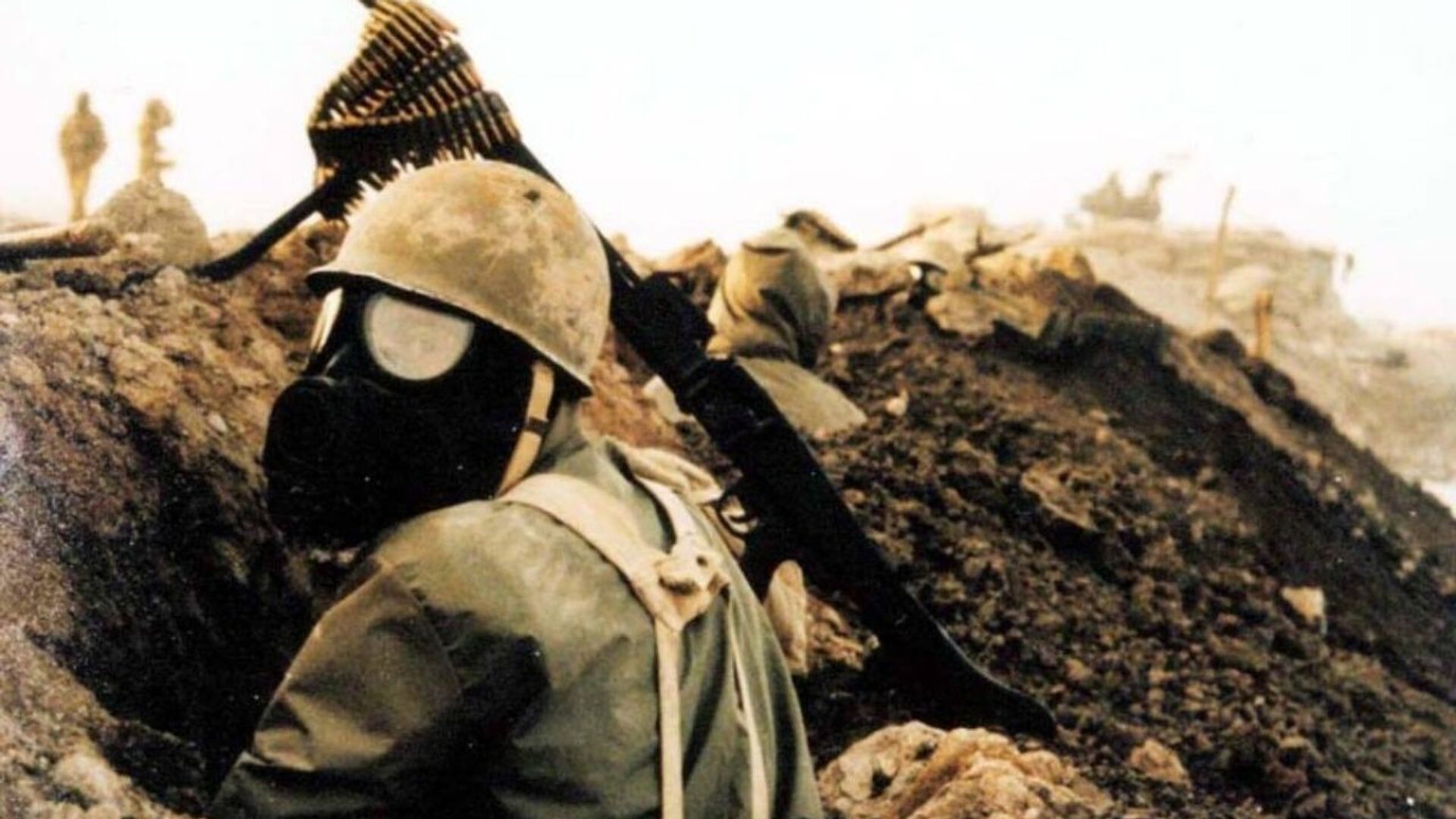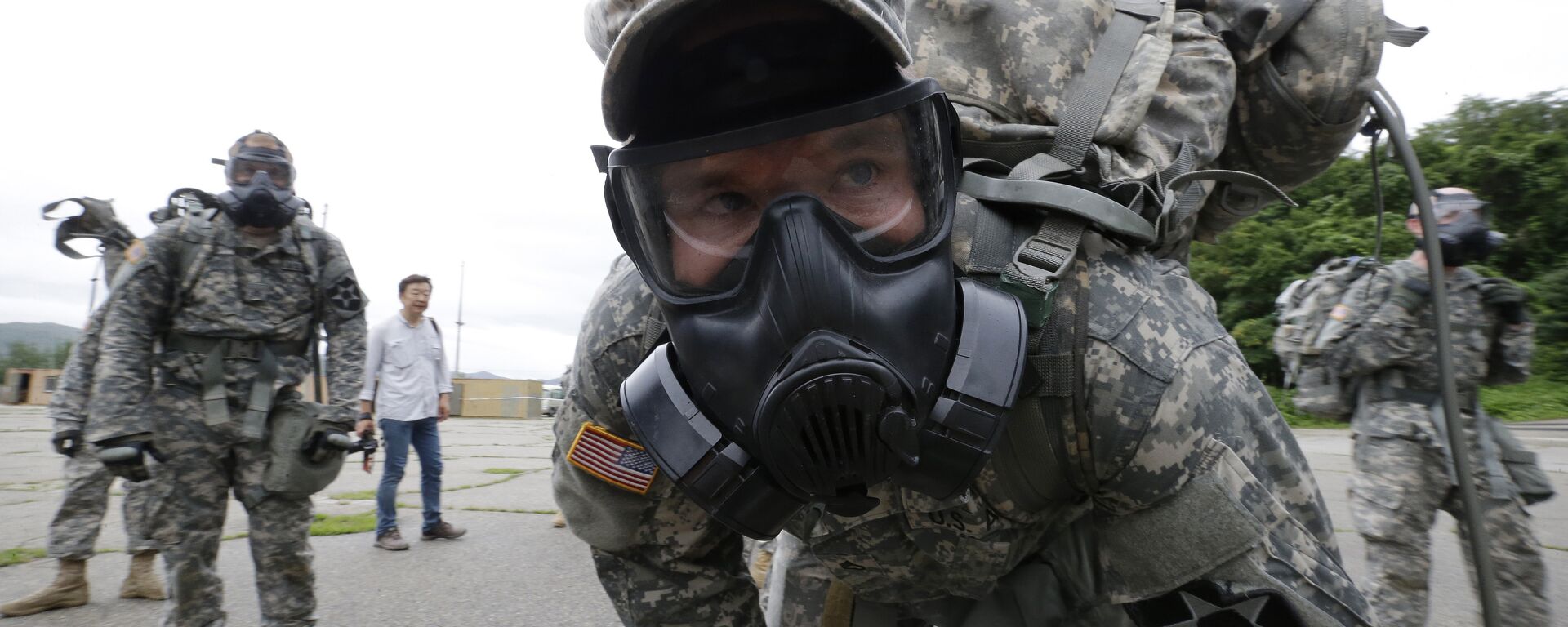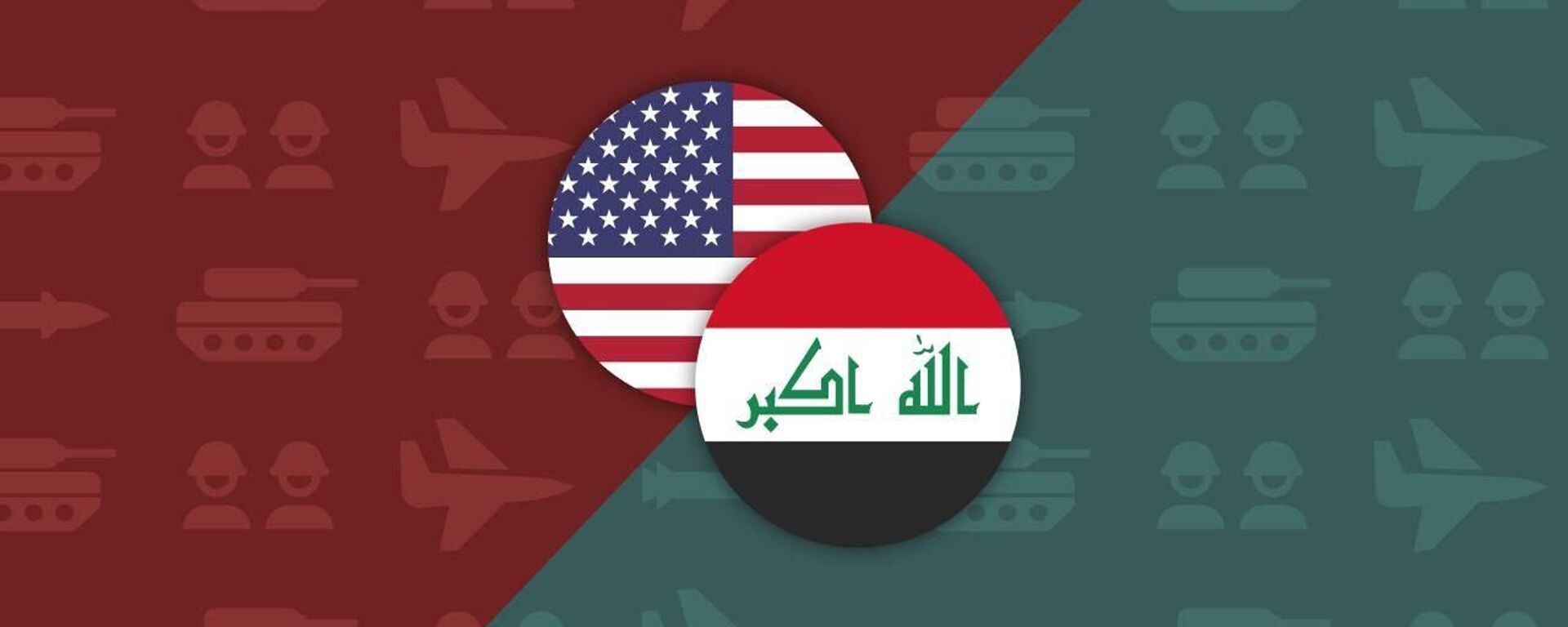https://sputnikglobe.com/20230318/iran-reminds-west-of-its-other-iraq-war-crime-giving-saddam-hussein-chemical-weapons-1108548947.html
Iran Reminds West of Its Other Iraq War Crime: Giving Saddam Hussein Chemical Weapons
Iran Reminds West of Its Other Iraq War Crime: Giving Saddam Hussein Chemical Weapons
Sputnik International
Sunday will mark the 20th anniversary of the US-led invasion of Iraq to oust Iraqi leader Saddam Hussein from power and “end the tyranny in Iraq,” as former President George W. Bush once put it. It’s become a largely forgotten fact of history, but Washington was actually an ally to Baghdad during the brutal Iran-Iraq War of 1980-1988.
2023-03-18T19:32+0000
2023-03-18T19:32+0000
2023-03-19T07:48+0000
chemical weapons
saddam hussein
20 years since us invasion of iraq
https://cdn1.img.sputnikglobe.com/img/107004/26/1070042602_0:80:1280:800_1920x0_80_0_0_04a1503fb8b8bbb5744427c6f93e27ea.jpg
A senior Iranian diplomat has called out Western hypocrisy on human rights by pointing to the thousands of Iranian and Iraqi civilians killed in chemical attacks during the Iran-Iraq War using weapons provided by the US and its allies."The results of arming Saddam’s regime with chemical weapons by Germany, the United States, France, the United Kingdom and the Netherlands are as follows: 13,000 deaths and 130,000 injured by chemical weapons in Iran, including 130 killed and 8,000 injured in Sardasht, 5,000 killed and 10,000 injured in Halabja," Iranian Judiciary deputy chief for international affairs Kazem Gharibabadi tweeted, referencing the Iraqi chemical attacks in western Iran and Iraqi Kurdistan in June 1987 and March 1988.The official's comments, which came as a response to a European Parliament resolution demanding a probe into a string of mysterious poisonings (which the parliament linked to "peaceful protests demanding democracy', but which Iranian officials said is tied to a covert "hybrid war against the country") come after months of rising tensions between Tehran and Brussels over EU attempts to interfere in the Middle Eastern nation's affairs.They also come ahead of the 20th anniversary of the March 19, 2003 US-led invasion of Iraq.Although Washington had a falling out with Saddam Hussein after Baghdad's 1990 invasion of Kuwait, Iraq and the US were close partners during the Iran-Iraq War –the brutal, eight-year conflict that began in 1980 when Hussein, seeking to take advantage of unrest in Iran following the 1979 Revolution, invaded the Islamic Republic to try and seize the oil-rich province of Khuzestan.The Iraqi Army began using chemical weapons against Iran on a large scale from late 1983 onward, killing thousands of soldiers and civilians and sickening over 100,000 more in over 350 large-scale gas attacks. After the war, Iraq acknowledged that it had used 1,800 tons of mustard gas, 600 tons of sarin gas, and 140 tons of tabun, a toxic nerve agent.Iran also had stockpiles of chemical weapons in its arsenal during the war, but never used them, notwithstanding its legal right to do so under international law. The Islamic republic was one of the first countries to destroy its chemical stockpiles, completing their elimination when it ratified the Chemical Weapons Convention in 1997.In 2018, the United States accused Iran of operating a secret chemical weapons program, in breach of its commitments under the CWC. Iran denied the claims and pointed out that the US has one of the largest declared stockpiles of chemical weapons in the world, with the timeline for their destruction pushed back over the decades in spite of Washington's pledge to eliminate them in the early 1990s.Iraq began to destroy its chemical weapons stockpiles in the 1990s after being required to do so by the United Nations Security Council. By the time the 2003 US-led invasion of Iraq rolled around, Saddam Hussein had eliminated the country's chemical weapons and other weapons of mass destruction programs, forcing the Bush administration to fabricate evidence of Iraqi WMDs as a pretext to justify the invasion.
https://sputnikglobe.com/20190628/iran-tells-us-to-get-rid-of-its-chemical-weapons-stocks-1076087792.html
https://sputnikglobe.com/20230318/setup-for-invasion-what-were-us-and-iraq-forces-in-2003-war--1108534172.html
Sputnik International
feedback@sputniknews.com
+74956456601
MIA „Rossiya Segodnya“
2023
News
en_EN
Sputnik International
feedback@sputniknews.com
+74956456601
MIA „Rossiya Segodnya“
Sputnik International
feedback@sputniknews.com
+74956456601
MIA „Rossiya Segodnya“
iraq, iran, chemical weapons, chemical arms, us, united states, west germany, iran-iraq war
iraq, iran, chemical weapons, chemical arms, us, united states, west germany, iran-iraq war
Iran Reminds West of Its Other Iraq War Crime: Giving Saddam Hussein Chemical Weapons
19:32 GMT 18.03.2023 (Updated: 07:48 GMT 19.03.2023) Sunday will mark the 20th anniversary of the US-led invasion of Iraq to oust Iraqi leader Saddam Hussein from power and "end the tyranny in Iraq," as former President George W. Bush once put it. It's become a largely forgotten fact of history, but Washington was actually an ally to Baghdad during the brutal Iran-Iraq War of 1980-1988.
A senior Iranian diplomat has called out Western hypocrisy on human rights by pointing to the thousands of Iranian and Iraqi civilians killed in chemical attacks during the Iran-Iraq War using weapons provided by the US and its allies.
"The results of arming Saddam’s regime with chemical weapons by Germany, the United States, France, the United Kingdom and the Netherlands are as follows: 13,000 deaths and 130,000 injured by chemical weapons in Iran, including 130 killed and 8,000 injured in Sardasht, 5,000 killed and 10,000 injured in Halabja," Iranian Judiciary deputy chief for international affairs Kazem Gharibabadi
tweeted, referencing the Iraqi chemical attacks in western Iran and Iraqi Kurdistan in June 1987 and March 1988.
“Attn: human rights advocates: this is also a crime against humanity. Please deal with it,” Gharibabadi added.
The official's comments, which came as a response to a European Parliament resolution demanding a probe into a string of mysterious poisonings (which the parliament
linked to "peaceful protests demanding democracy', but which Iranian officials said is
tied to a covert "hybrid war against the country") come after months of rising tensions between Tehran and Brussels over EU attempts to interfere in the Middle Eastern nation's affairs.
They also come ahead of the 20th anniversary of the March 19, 2003 US-led invasion of Iraq.
Although Washington had a falling out with Saddam Hussein after Baghdad's 1990 invasion of Kuwait, Iraq and the US were close partners during the Iran-Iraq War –the brutal, eight-year conflict that began in 1980 when Hussein, seeking to take advantage of unrest in Iran following the 1979 Revolution, invaded the Islamic Republic to try and seize the oil-rich province of Khuzestan.
The US and its NATO allies began funneling billions of dollars in weapons, dual-use technology, and military technology to Baghdad after a string of defeats reversed Iraq’s fortunes, and a series of Kurdish uprisings in the country’s north threatened the country with collapse. This included the sale of chemical weapon precursors, as well as chemical warfare equipment.
The Iraqi Army began using chemical weapons against Iran on a large scale from late 1983 onward, killing
thousands of soldiers and civilians and sickening
over 100,000 more in over 350 large-scale gas attacks. After the war, Iraq
acknowledged that it had used 1,800 tons of mustard gas, 600 tons of sarin gas, and 140 tons of tabun, a toxic nerve agent.
Iran also had stockpiles of chemical weapons in its arsenal during the war, but never used them, notwithstanding its legal right to do so under international law. The Islamic republic was one of the first countries to destroy its chemical stockpiles, completing their elimination when it ratified the Chemical Weapons Convention in 1997.
In 2018, the United States
accused Iran of operating a secret chemical weapons program, in breach of its commitments under the CWC. Iran denied the claims and pointed out that the US has one of the largest declared stockpiles of chemical weapons in the world, with the timeline for their destruction pushed back over the decades in spite of Washington's pledge to eliminate them in the early 1990s.
Iraq began to destroy its chemical weapons stockpiles in the 1990s after being required to do so by the United Nations Security Council. By the time the 2003 US-led invasion of Iraq rolled around, Saddam Hussein had eliminated the country's chemical weapons and other weapons of mass destruction programs, forcing the Bush administration to fabricate evidence of Iraqi WMDs as a pretext to justify the invasion.




